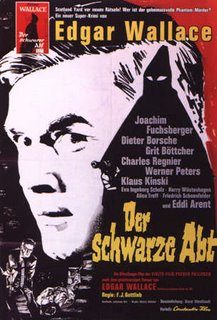
If you’re a Klaus Kinski fanatic like me you’re bound to become a krimi watcher at some point. It's impossible to neglect this crucial, early chapter in the man's career, which includes close to two dozen films made during the 1960s. THE BLACK ABBOTT (aka DER SCHWARZE ABT) is one of Klaus's earliest krimi appearances, falling between THE BLACK COBRA (DIE SCHWARZE KOBRA) and THE INDIAN SCARF (DAS INDISCHE TUCH), all 1963.
Thanks to the recent Edgar Wallace DVD box sets many of these flicks are becoming available in uncut, widescreen versions for the first time, though I believe they are currently only available as PAL/Region 2 releases. (See Xploitedcinema.com for all eight (!) box sets as well as many single disc releases.) THE BLACK ABBOTT comes from Box 4 which also includes the aforementioned THE INDIAN SCARF, ROOM 13 and DER HEXER (a particular favorite of the titles I've seen so far), though the latter two are non-Kinski-related.
Most, if not all, the krimis that I've seen – and my education is admittedly in its infancy – have been of the "whodunit" variety, with a masked or unseen figure carrying off a spate of crimes that leave sleuths of the professional and amateur type scratching their heads. Red herring after red herring is laid at the viewer's feet until everything comes careening together in a last minute unmasking that's filled with twists, turns and the inevitable revelation of false identities.
It's no wonder these flicks give me a headache. The plotting is dense despite their compact running times, background info on characters is often sketchy and picked up on the fly, and you'd need a scorecard to keep track of the intertwining relationships of everybody involved.
THE BLACK ABBOTT is no exception, though it's far less of a "whodunit" than it is a thriller packed with traditional krimi elements.
Krimi regular Joachim Fuchsberger (DER HEXER's Inspector Higgins) stars here as Dick Alford, cousin and administrator to Lord Chelford (Dieter Borsche), the last lord of Fossaway Manor. When hunter Mr. Smooth gets offed by the hooded Black Abbott in the film's pre-credit sequence, Inspector Puddler (Charles Regnier) and comic relief assistant Horatio Smith (omnipresent Eddi Arent) arrive in an attempt to get to the bottom of things.
Naturally, there's no shortage of villains and nefarious types to choose from. There's Gilder (Werner Peters of THE THOUSAND EYES OF DR. MABUSE), a blackmailing corporate secretary leading a double life as a bookie who lusts after Leslie, the sister of his employer, Arthur Gine (Harry Wustenhagen). Gine, of course, is a degenerate gambler who has unwittingly paid hundreds of thousands of pounds to Gilder through the years and also happens to be embezzling from the Chelford fortune. Mary Wenner (Eva Ingeborg Scholz) is a heartless gold-digger with designs on becoming Lady Chelford so she can get her hands on the legendary Chelford treasure.
Alford is no prince, either. He's up to some kind of shenanigans with his cousin's physician Dr. Loxon (Friedrich Schoenfelder) all the while taking horseback rides and long walks with Leslie Gine (Grit Bottcher), his cousin's intended.
Got that? If so maybe you can explian it all to me.
Last, but certainly not least, is Kinski as Thomas Fortuna, the detached, almost robotic butler of Fossaway Manor. A whimsical smile dancing across his lips, the role of the butler who is more than he appears to be is perfectly suited to Kinski's icily superior air. In one of my favorite exchanges in the witty script, Lord Chelford informs Fortuna that "The more I see you the more I dislike you" to which the butler replies, "I regret, my lord, that my face annoys you."
As I said, THE BLACK ABBOTT is less a whodunit than a thriller with Lord Chelford slowly but surely embracing his paranoia about everybody and descending into complete madness. Mary and Gilder team up to search for the hidden treasure while everybody (or so it seems) starts hanging around the estate's gravel pit. And not one but two Black Abbotts appear along the way, with neither being the red herring I suspected.
I don't like divulging plot details in my reviews, especially when it comes to krimis, so I'll end it there. The flick looks great, all crisp black and white with a splash of red thrown in at the beginning and end credits. The witty script by Johannes Kai and director Franz Josef Gottleib is a tad convoluted, but that's to be expected when compressing one of Wallace's novels into an 88-minute running time, and prolific composer Martin Bottcher does a nice job of contemporazing the staid pastoral setting with his funky score.
As for Klaus, I'm still working my way through a bevy of krimis (I have a baker's dozen or more on tap) but I dug this performance more than his turn in 1961's DEAD EYES OF LONDON. He's condescending while at the same time defferential and his head often seems too big for his body, making him resemble a walking bobblehead.

No comments:
Post a Comment